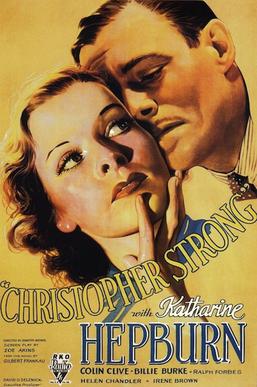There may be a notion that Christopher Strong is about the Katharine Hepburn character given her prominence in the film and poster. She is not the title character. She is, however, that not-so-obscure object of desire to the title character. Christopher Strong is a good albeit dated film.
A Roaring Twenties scavenger hunt among the Lost Generation does not have wild success. Its host, Carrie (Irene Browne) then offers prizes for the most outlandish finds: a man married more than five years who has remained faithful and a woman over 30 who has never had a romance. Carrie's niece, Monica Strong (Helen Chandler), knows the perfect person for Exhibit A: her father, Sir Christopher Strong (Colin Clive). Monica's married lover, Harry Rawlinston (Ralph Forbes), almost crashes into Exhibit B: Lady Cynthia Darrington (Hepburn), a famous aviatrix.
Monica takes an instant liking to Lady Cynthia, seeing in her something of herself, a daring independent woman. Lady Cynthia is also supportive of Monica being Harry's mistress, something Monica's mother Lady Elaine (Billie Burke) is not. Soon, Lady Cynthia becomes a heroine for Monica. Eventually though, we find that Exhibit A and Exhibit B will no longer fit their categories. Like the moth that Lady Cynthia dressed as for a costume ball, Sir Christopher is drawn to her fire.
Unsurprisingly, an affair begins between Strong and Darrington. In short time, Harry is now divorced and free to marry Monica. Just before their nuptials, Monica discovers Sir Christopher and Lady Cynthia in an intimate tête-à-tête where she and Harry would meet. Monica, despite her issues with her mother, will protect her from hurt. Monica soon is with child, and so is Lady Cynthia. Lady Cynthia ends her retirement from flying, ostensibly to break an altitude record. However, she dies in the process, and a statue to Lady Cynthia Darrington is built in her memory.
Christopher Strong was directed by Dorothy Arzner, the rare female director working at the time. That may be a reason why Christopher Strong is more remembered nowadays, but that would be a disservice to both Arzner and Christopher Strong. The film is quite good for the most part.
One is slightly taken aback at the thought of Colin Clive as the romantic lead. Given that his most famous role is that of Dr. Frankenstein in the 1931 Universal film. I would argue that he is a bit stiff as the title character, but it works here given that Sir Christopher is a bit stiff.
Hepburn is in her second film with Christopher Strong, playing a part both typical and atypical for her. The atypical part is that Hepburn is playing a mistress. The usual Hepburn persona would not tolerate an affair with anyone while they were married to someone else. The typical part is how Hepburn is a strong woman, an aviatrix no less. I would say that there is a bit of a formality to her acting too, as if trying a bit hard to be British. However, on the whole it was a good performance.
Interestingly, one of the most surprising performances was that of Burke as the wronged wife. She was nowhere near as fluttery as she so often played in films such as Topper or even The Wizard of Oz. Here, she was stoic, even tragic. One can't blame her: her husband is shtupping a glamorous aviatrix, her daughter is a man's mistress.
One thing that does take modern viewers a bit by surprise is how daring and open Christopher Strong is on the subject of infidelity. A major subplot is Monica being Harry's mistress. Harry is presented as a surprisingly good man, one who cares for and about Monica. While I think the film makes a point of noting that Harry's wife is not a good person, it still is surprising how him having an affair with another woman is not held against him. In fact, only Monica's mother seems upset by the liaison, with Christopher not being pleased but also not pushing hard to end it.
More daring is a scene where Christopher and Cynthia are having pillow talk. Christopher and Cynthia reunite in New York after she has successfully circumnavigated the globe. We see a lamp turned on, and a hand appear, admiring a diamond bracelet. "No I am shackled," Hepburn states. Let us put apart the overt symbolism of Zoe Adkins' adaptation of Gilbert Frankau's novel. As directed by Arzner, it is as overt a statement that Christopher and Cynthia are in bed after a tryst. We do not see their bodies or even their faces, just Cynthia's hand and wrist.
However, we hear their voices as they say words of love, soft and tender, to each other. He begs her to retire from aviation, and it sets up her future out-of-wedlock pregnancy. It is overt without being in your face. A very thin case can be made that they are merely sitting together, with her turning the light on. However, it cannot be read any other way other than they had sex and are now enjoying a little afterglow.
Finally, the closing montage of Cynthia's remembrance of her first and only romance is well edited in a montage as she reaches the heavens only to literally crash back to Earth. Arzner also has an interesting way of transitioning between scenes: not exactly a swipe but more like drawing curtains.
Christopher Strong, apart from being a bit staged and stilted owing to the limits of the times, is a good film. We see early Katharine Hepburn as she begins to build her career and persona. This might be worth revisiting in a remake.



No comments:
Post a Comment
Views are always welcome, but I would ask that no vulgarity be used. Any posts that contain foul language or are bigoted in any way will not be posted.
Thank you.